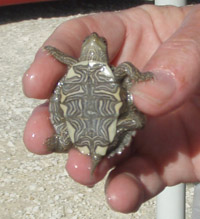2012 Salmonella Infections Linked to Small Turtles – Consumer Advice
Eight Multistate Outbreaks of Human Salmonella Infections Linked to Small Turtles (Final Update)
Posted October 18, 2013 3:00 PM ET
These outbreaks appear to be over. However, small turtles continue to be an important cause of human Salmonella infections in the United States. More information about Salmonella from reptiles and amphibians and the steps people can take to reduce their risk of infection is available.
Advice to Pet Owners
- Do not purchase turtles with a shell length of less than 4 inches in size.
- Do not give turtles with a shell length of less than 4 inches in size as gifts.
- Keep turtles out of homes with children younger than 5 years old, elderly persons, or people with weakened immune systems.
- Turtles and other reptiles should not be kept in child care centers, schools, or other facilities with children younger than 5 years old.
- Contact with other reptiles (snakes and lizards) and amphibians (frogs and toads) can also be a source of human Salmonella infections. Learn more about reducing the risk of illness from turtles and other reptiles and amphibians.
- This information is also available in Spanish, French, and Chinese.
- If you buy a turtle, make sure the shell length is greater than 4 inches.

Photo of a small turtle.
Options for Unwanted Turtles
- Releasing unwanted turtles into the wild is not recommended. These turtles are not likely to survive in the wild, and they may introduce diseases to wild animals and their environment.
- Some pet retailers and pet stores may accept unwanted turtles.
- Consult with your local animal shelter to determine if they accept unwanted turtles.
- Talk to your veterinarian about other options.
Advice to Pet Store Owners and Others Who Sell or Display Reptiles and Amphibians
- Pet stores, street vendors, and others should not sell or distribute turtles with shell lengths less than 4 inches. Be aware that the distribution of these small turtles is prohibited by federal law. Distribution of pet turtles includes offering them for adoption or for free with or without the purchase of pet supplies (e.g., turtle tanks, food, etc.).
- Pet stores, street vendors, and others who sell or display turtles should provide health-related information to owners and potential purchasers of turtles near the turtle display prior to the point of purchase, not at the cash register.
- This should include information about the risk of acquiring a Salmonella infection from turtles and water in their habitats (e.g., tanks or aquariums) and instructions for proper cleaning of the turtle habitat. Posters containing this information are available in English, Spanish, French, and Chinese.
- More information on displaying animals in public settings can be found in the 2011 Compendium of Measures to Prevent Diseases Associated with Animals in Public Settings [PDF – 1.3 MB].
Advice to Health Care Providers
- Health care providers should question patients on pet and animal ownership and should provide education about the risks of acquiring salmonellosis from reptiles (e.g., turtles) and amphibians (e.g., frogs).
- Health care providers should advise patients on proper hand washing practices.
Advice to Veterinarians
- Veterinarians should provide education to reptile and amphibian owners about the risks of acquiring salmonellosis from these animals.
- Veterinarians should provide education to reptile and amphibian owners on how to properly clean the animal habitat.